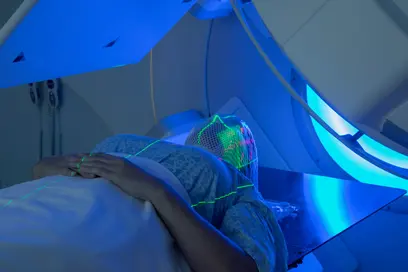Numerous biochemical and medical detection methods are based on the use of short chains of amino acids called peptides which are produced synthetically and affixed on the surface of a piece of glass. Such peptide microarrays can be used for identifying pathogens or developing new substances for drugs. Diagnosis of cancers might also be improved with these microarrays. A disadvantage of peptide microarrays has been that their production is time-consuming and costly.
Dr. Volker Stadler (PEPperPRINT), Dr. Frank Breitling (KIT) and Dr. Ralf Bischoff (DKFZ) are co-founders of PEPperPRINT GmbH. Over the past few years they have developed a novel technique that overcomes the technological hurdles in the production of peptide microarrays. The company’s name, PEPperPRINT, says it all: The twenty different peptide building blocks are embedded in toner particles and printed on the glass surface using a special 24 color laser printer. This production technology makes it possible to increase the number of peptides per surface by 80 times and reduce manufacturing costs by 50 times. The technology therefore opens up a whole new range of options for research.
This concept was also commended by the jurors of the German Industry’s Award 2010. PEPperPRINT was the winner in the category “Start-Up Companies", i.e. companies that have been competing in the market for less than five years. Last Saturday, PEPperPRINT, which started operations in 2010, was presented the prestigious award, which is also the world’s first innovation award. Since 1980, the Rhine-Main Industry Club (Wirtschaftsclub Rhein-Main) has annually rewarded Germany’s most innovative enterprises with this award.
The 2010 award winners were honored at a festive event at Frankfurt’s Congress Center for their outstanding technological, scientific and intellectual accomplishments by Research Minister Annette Schavan, who sponsors the innovation award. “We are very happy and proud of this distinction!" said Volker Stadler after receiving the award. “Of course, there is a lot more to come. Peptide microarrays will become increasingly important for science and we are continuously working to refine our products for new applications," said Frank Breitling explaining PEPperPRINT’s business strategy.
In cooperation with the Karlsruhe Institute of Technology (KIT), where Frank Breitling has been working since 2009, production of peptide microarrays will be optimized in the future. Aims include further increasing the number of peptides per microarray while at the same time reducing costs of production – and, thus, of healthcare research. At KIT, one of the leading energy research centers in Europe, projects will also aim to develop peptide microarrays in a modified form towards photovoltaic and fuel cells.
A picture of the PEPperPRINT Team is available on the Internet at:
www.dkfz.de/de/presse/pressemitteilungen/2011/images/pepperprint.JPG
Picture caption, from left to right: Dr. Frank Breitling, Dr. Volker Stadler, Thomas Felgenhauer, Dr. Ralf Bischoff
Source: Nicole Schuster, DKFZ
About DKFZ
With more than 3,000 employees, the German Cancer Research Center (Deutsches Krebsforschungszentrum, DKFZ) is Germany’s largest biomedical research institute. DKFZ scientists identify cancer risk factors, investigate how cancer progresses and develop new cancer prevention strategies. They are also developing new methods to diagnose tumors more precisely and treat cancer patients more successfully. The DKFZ's Cancer Information Service (KID) provides patients, interested citizens and experts with individual answers to questions relating to cancer.
To transfer promising approaches from cancer research to the clinic and thus improve the prognosis of cancer patients, the DKFZ cooperates with excellent research institutions and university hospitals throughout Germany:
- National Center for Tumor Diseases (NCT, 6 sites)
- German Cancer Consortium (DKTK, 8 sites)
- Hopp Children's Cancer Center (KiTZ) Heidelberg
- Helmholtz Institute for Translational Oncology (HI-TRON Mainz) - A Helmholtz Institute of the DKFZ
- DKFZ-Hector Cancer Institute at the University Medical Center Mannheim
- National Cancer Prevention Center (jointly with German Cancer Aid)
The DKFZ is 90 percent financed by the Federal Ministry of Research, Technology and Space and 10 percent by the state of Baden-Württemberg. The DKFZ is a member of the Helmholtz Association of German Research Centers.



